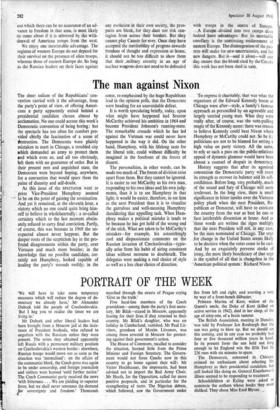The man against Nixon
The sheer tedium of the Republicans' con- vention carried with it the advantage, from the party's point of view, of offering Ameri- cans a party apparently united behind a presidential candidate chosen almost by acclamation. No one could accuse this week's Democratic convention of being boring: 'but the spectacle has too often for comfort pro- vided chiefly the fascination of a scene of destruction. The Democrats were plainly mistaken to meet in Chicago, a troubled city which demanded an army to protect them and which even so, and all too obviously, left them with no guarantee of order. But in their present rent and anguished state, the Democrats were beyond hoping, anywhere, for a convention that would spare them the pains of disunity and self-doubt.
As this issue of the SPECTATOR Went to press Vice-President Humphrey seemed to be on the. point of gaining the nomination. And yet it remained, at the eleventh-hour, a victory which no .one could quite bring him- self to believe in wholeheartedly : a so-called certainty which to the last moment obstin- ately refused to carry final conviction. Partly, of course, this was because in 1968 the un- expected almost never happens. But the deeper roots of the scepticism lay in the pro- found disagreements within the party, over Vietnam and much more besides; in the knowledge that no possible candidaje, cer- tainly not Humphrey, looked capable of healing the party's wounds swiftly; in the sense, re-emphasised by the huge Republican lead in the opinion polls, that the Democrats were heading for._an unavoidable defeat.
It is worth speculating briefly, today, upon what might have happened had Senator McCarthy achieved his ambition in 1964 and -become President Johnson's running-mate. The remarkable crusade which he has led against the Vietnam war could never have happened in the way it did. On the other hand, Humphrey, with his lifelong taste for the liberal role, could without difficulty be imagined in the forefront of the. forces of dissent.
The personalities, in other words, can be made too much of. The forces of division exist apart from them. But they cannot be ignored. It is easierto see McCarthy as his own man, responding to his own ideas and his own judg- ments, than it is to see Humphrey in that light; it would be easier, therefore, to see him as the next President than it is to visualise the garrulous and well-meaning Humphrey shouldering that appalling task. When Hum- phrey makes a political mistake it tends to be because he has got hold of the wrong end of the stick. What are taken to be McCarthy's mistakes—for example, his .astonishingly cool and dispassionate comments on the Russian invasion of Czechoslovakia—typic- ally arise from his habit of airing consistent ideas without recourse to doubletalk. The delegates were making a real choice of style as well as a less clear choice of direction. To express it charitably, that was what the organisers of the Edward Kennedy boom at Chicago were after—style, a family's famous approach as personified by an agreeable and largely untried young man. What they were really after, of course, was the vote-pulling magic of the Kennedy name; there was reason to believe Kennedy could beat Nixon where Humphrey or McCarthy could not. So be it: politicians are not to be blamed for setting a high value on party victory. All the same, to rely at such a pass on the public-relations appeal of dynamic glamour would have been almost a counsel of despair in democracy.
History suggests that after its agonised convention the Democratic party will exert its strength to recover its balance aid its self- confidence. Before long, very probably, much of the sound and fury of Chicago will seem irrelevant. In the long view, there is small significance in bitter tussles over the Vietnam policy plank when the next President, Re- publican or Democrat, will have to extricate the country from the war as best he can or face intolerable dissension at home. And as These words are written the signs multiply that the next President will not, in any case, Abe the man nominated at Chicago. The urge ,.for change in the United States seems likely to be decisive when the votes come to be cast. And by an exquisitely perverse stroke of irony, the most likely beneficiary of that urge is the symbol of all that is changeless in the American political system : Richard Nixon.


































 Previous page
Previous page